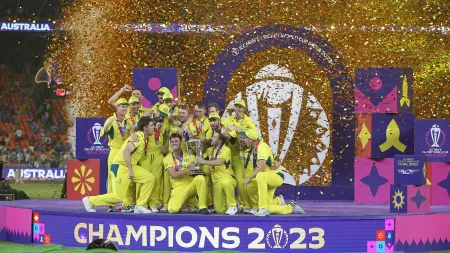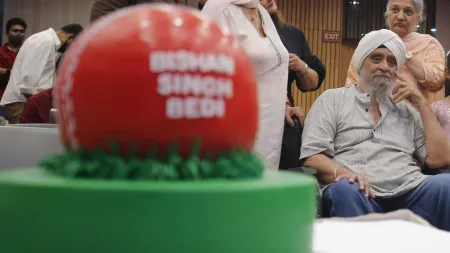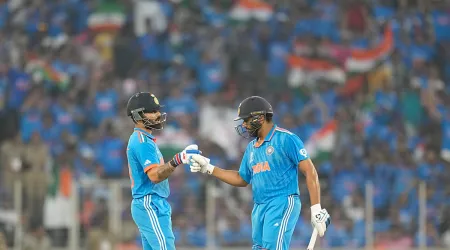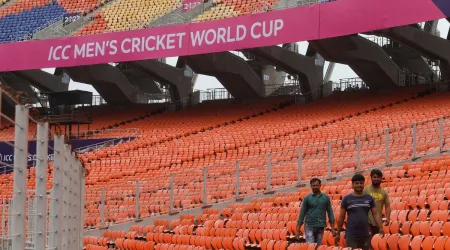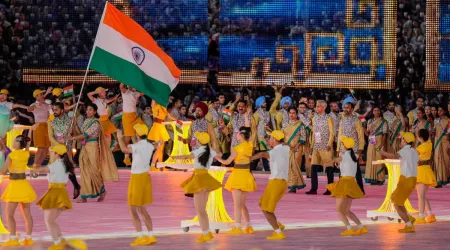- India
- International
In squash kingdom, a 16-year-old Egyptian Habiba Mohamed rises
At 16, Habiba Mohamed's the latest prodigy to come out of the impressive Egyptian squash production line.
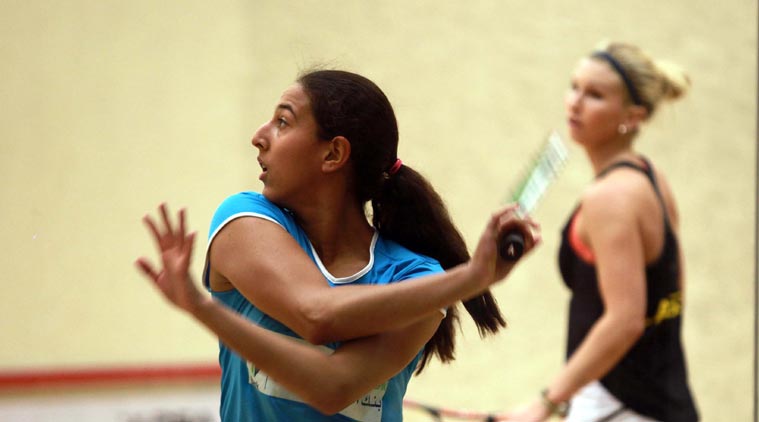 Habiba Mohamed (L) is currently ranked 25th in the world. (Source: Express photo by Kevin D’Souza)
Habiba Mohamed (L) is currently ranked 25th in the world. (Source: Express photo by Kevin D’Souza)
In one of her first ever television interviews, squash prodigy Habiba Mohamed had mentioned that she would like to meet Egyptian President Abdel Fattah el-Sisi as a gift for winning the 2014 Junior World Squash Championship. She recalls how she didn’t think too much about that request when she boarded the plane from Namibia, where the junior Worlds was held, for her home town in Alexandria, Egypt. Yet, as soon she walked in through the front door of her house, a call came on her mobile phone from an unknown number. “It was from the President’s office. He wanted to meet me,” giggles the 16-year-old as she recollects the event.
The subsequent trip to Cairo was one she claims as her favourite. “I was a bit nervous because I didn’t know what to wear. But then I was told the President wanted to meet me in my normal sports gear, so I wore my track-suit,” she says. El-Sisi praised the youngster for her performance and bid her goodbye with a promise that he will meet her again if she wins another junior world title. “I lost the final this year,” she laments. “But I still have a few years more to try,” she adds.
[related-post]
At 16, she’s the latest prodigy to come out of the impressive Egyptian squash production line. The world No. 25 is currently in Mumbai competing as top seed in the women’s category at the National Sports Club of India (NSCI) Open. Mohamed, in fact, had announced her presence on the Women’s Squash Association (WSA) circuit two years ago at the Malaysia Grand Tour Finals, when she became the youngest ever player, at 14, to win a WSA event. Not surprisingly, she’s been pegged to be the next big name in squash.
In Egypt, though, not many are surprised by her success. Four of the top 10 women players are from Egypt. And it’s training with those four that prepares the ground for the constant grooming of talent.
Mohamed was a beneficiary of such a system, having been given the opportunity to train with her childhood idol, and current world No. 1 Raneem El Welily.

“Training with such big names means you get to learn from the best. You want to continue playing with them and for that you need to make sure you’re getting better, otherwise they’ll pick someone else to rally with. So you have no option but to improve,” says Mohamed.
Elite players, as they are termed in Egypt’s circuit, are contractually obliged to the local squash sports club’s terms and conditions which clearly state they need to practice with junior players. As such, the traditional style of play propagated by the North African nation gets smoothly passed on in this manner.
Omneya Abdel Kawy is sixth in the world and was the first Egyptian girl to win the Junior World Championship. In seventh is Nour El Sherbini who is the only player to win the junior world title three times, while world No. 8 Nour El Tayeb is also a former junior world champion. Omneya (2010) and Nour (2013) finished runners-up in the senior Worlds, and Egypt now awaits its first women’s world champion, and the sheer volume of Egyptian players only makes it imminent.
The Egyptians are noted flair players who have employed and perfected shots that incorporate a great degree of wrist-work. European play, meanwhile, is based on strength, speed and consistent stroke-play.
“We can’t last long in a rally with them because they don’t get tired. That’s why we tend to be brave in our attacking shots,” asserts Karim El Hammamy, 2013 junior world champion.
Subsequently, it’s the aggressive play the Egyptians have learned to master. “Other players practice 1000 consistent shots a day. The Egyptians practice 1000 drop shots a day,” notes former national champion Ritwik Bhattacharya, who has watched youngsters from Egypt consistently trouble Europeans and Australians in women’s squash.
“The climate also makes a difference. It’s cold in Europe and the ball doesn’t bounce much, and so players have to use a lot of force. In Egypt, it’s warmer and the ball bounces well. So the players get a good feel of the ball and learn how to place their shots,” he adds.
Furthermore, there has been a greater emphasis on fitness in the African nation in recent years. “We’re not too far behind now when it comes to fitness,” claims El Hammamy.
Then there is the constant financial support that comes from the government, along with the technical and mental grooming from elite stars. Just a month before arriving in India, Mohamed failed to defend her junior world crown against compatriot Nouran Gohar. Depressed by the loss, she recalls weeping into a towel after the game until she heard her phone ring. This time it was a message from another of her idols, men’s world No. 1 Mohamed El Shorbagy. “It said, ‘you are a champion and sometimes even champions fall. But when they get back up, they’re stronger. So keep working’,” she recites.
The singular text message is stored safely on her mobile phone. Mohamed explains that she reads the message every time she feels nervous before a tough game. It’s one of the few rituals she follows. The other is taking a good look at the framed photograph at home every time she leaves for a competition — the one of her with the President.


















